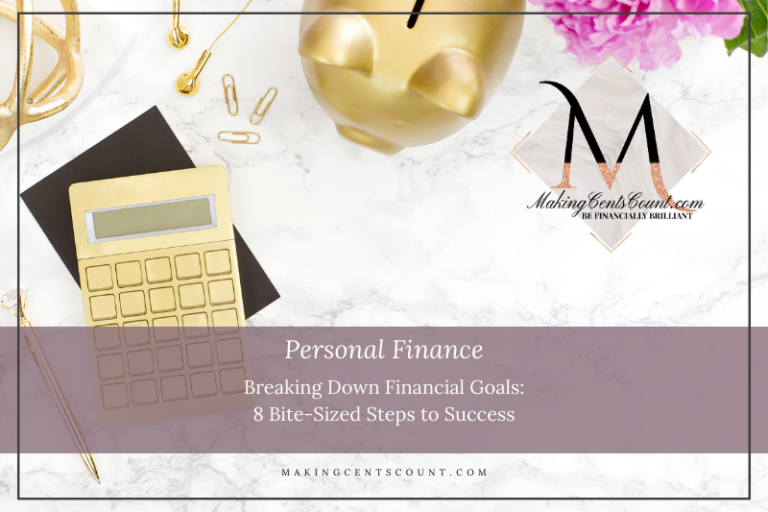The Busy Woman’s Guide To Growing Your Money
Estimated reading time: 12 minutes
I know you’ve got a lot on your plate! Like most of us, after a long week at work, the last thing on your mind is personal finance. I get it.
But if you’re anything like me, you’re also not too thrilled at the thought of your earnings sitting in the bank. Especially when it’s earning a barely-there interest rate, and you know you could be growing your money faster. Or worse yet: you’ve spent all your money by the month’s end and don’t know where it went.
Table of Contents
Are you ready to start investing, control your finances, and prepare for retirement? Join our amazing community! You’ll receive exclusive financial tips from Making Cents Count, as well as unlimited FREE access to our resource library full of money-saving tools and guides.
Well, it’s time to get a handle on your financial plan. Like planting seeds in a garden, growing your money takes effort. But like a garden, it also depends on many outside factors. Once you’ve planted (in other words, invested) your money, you don’t need to keep following along on a day-to-day basis. Your money will start growing ALL on its own.
Ready to begin? It starts by taking a look at your financial picture to free up “seeds” to start growing your money. In less than a few months, with a little bit of effort, you’ll enjoy a much “rosier” financial picture. Start growing your money in no time with these 14 questions.
Planting Seeds to Start Growing Your Money
To start, you need to get an idea of where you are financially. This means looking at your current budget practices (and I know, not everyone LOVES the idea of a budget). Not to worry, you can still start growing your money even if you’re not a big budgeter. Start with these questions to shape your approach.
1. Do You Work From a Budget, and If So, How In-Depth is it?
The first question is, what does your budget look like now? Do you use a budget-type worksheet, or do you keep track of it in your head?
There are no wrong answers to this question. For those who prefer a quick overview or snapshot of their finances, check out my post (where you’ll find a free worksheet) on creating a Monthly Financial Snapshot. If you find you aren’t a numbers-oriented person, consider a low-maintenance investment that’s also low-risk, such as a money market fund.
If you prefer using Excel versus pen to paper then snag our all-inclusive financial spreadsheet! Our Monthly Budget Workbook Template is available for purchase. This speadsheet is ideal if you’re wanting to get a jumpstart on your financial journey to success.
If you’re a fan of the planned approach but need help getting started with a budget, check out my post on budgeting and setting financial goals. This post will help you set up your budget and get a handle on the numbers. Don’t worry—there are plenty of ways to automate your budget so most of it runs on autopilot. You won’t spend every Saturday budgeting your heart out.
2. What Does Your Timeframe Look Like for Growing Your Money?
Growing your money by investing is smart, but for the wisest choices, you need a clear picture of your timeframe. Are you planning to access the funds in the next five years? Are you mainly hoping to save for retirement? While longer-term investments (401(k)s, IRAs, and certain life insurance policies) can often yield higher returns, it’s essential to be aware that there are often high penalties on early withdrawals.
Now, that doesn’t mean you shouldn’t invest in higher-yield options like CDs, but you may want to ladder the terms as you invest, especially if you’ll need shorter-term savings strategies. If you’re setting up an emergency fund or a 3-6 month savings account, you may want to opt for a high-yield bank account to access your funds in emergencies.
3. What is the Big Purchase or Outcome You Have in Mind?
Growing your money to invest in a house (or upgrade to a bigger house) looks quite different from saving up for a vacation. Smaller purchases may come to fruition after a few months of growing your money with smart strategies like careful budgeting or working side hustles.
Other more substantial investments like education, a home, or retirement require a sustainable, strategic plan. If your employer offers a pre-tax retirement vehicle like a 401(k), this is a great option to take advantage of, especially if they provide a match. Another option is to invest in a tax-deductible Traditional IRA. (Keep in mind, a Roth IRA allows tax-free withdrawals.)
4. What’s Your Biggest “WHY” Behind Growing Your Money?
The biggest asset you have when it comes to growing your money is to understand your reason why. For most of us, investing without a grip on the big picture isn’t motivating. If you’re so busy that you barely have time to think about the long term, it’s hard to think of saving for a rainy day.
Think of your big, long-term goals, a.k.a., your “Stretch Goals.” What are the biggest, scariest, toughest goals you’re working toward? Limit yourself to a few—I like to stick with no more than three at a time. From there, I break it down into smaller micro-goals and manageable steps. Knowing I’m working toward these big “whys” helps me keep my focus.
Assessing Your Budget
Alright, now it’s time for the rubber to hit the road. These are a few somewhat easy questions to help you get a quick handle on your finances. Whether you write out your budget or it’s more of a concept, going through these questions will help you know where you stand.
5. How Many Accounts Do You Have?
Like most of us, you probably have a checking account, a savings account, and possibly a retirement account or another type of account. Of course, the fewer accounts you have (especially if you’re super busy), the easier it is to manage the moving pieces. If there are old accounts you aren’t using anymore, you may want to close them out for the sake of simplicity.
6. Are There Any Items You Can Cut Out?
Here’s the toughest question: Where can you cut? Take a look at your accounts and assess what’s going out. Are there items automatically pulling from your account that you no longer use?
Yep, like your old gym membership, Netflix (Hulu AND Amazon Prime?), or the app subscription you never use. All those little items seem small, but they add up. You may find yourself with a few hundred dollars a month, and that adds up to more interest in growing your money!
7. What Can You Automate?
If you are busy (and who isn’t?!), chances are you lose track of what’s happening in your bank account now and then. Are bills ever late? Do you forget when payments are coming out? (Oops.) Although it takes a little time, look at everything you can automate in your budget. Ultimately, automation will give you a much clearer handle on what’s going on. If you want more control over your money, automate, automate, automate! It eliminates the chance of human error.
8. What is Your Debt Situation?
It’s not always a topic we like to face, but it’s essential to look at your debt situation when you examine your budget. Look at what you’re paying on your debt.
If you have a mortgage, are you getting the best rate, or could you refinance? Do you prefer to pay your debt down in a lump sum or increments? Look at interest and see if there’s a way to minimize your debt as much as possible.
9. How Much Do You Travel and Spend on Entertainment?
Now that you’ve automated and streamlined your finances, it’s time to start planning in your travel and entertainment.
Now, I get it: life is short. We all like to be spontaneous every now and again. When you get a chance to pack up and go on an adventure for the weekend, it’s hard to say no. But remember, spontaneity has a price. If you plan your travel, shopping, and entertainment a little in advance, you will save on tickets, airfare, clothing, and more. Look at your entertainment budget and start to piece together a realistic picture.
Because of my personal obsession with shoes and traveling, I’ve had to learn to plan just a little further in the future. Doing just a bit of planning showed me almost immediate results (and who doesn’t love instant gratification?!). The less I paid for airfare by planning ahead, the more I can spend on shoes. In the beginning, it was painful, but once I realized the trade-off meant more shoes and travel, it was well worth it!
10. What Do Your Finances Look Like for the Next Year?
Once you feel your budget is realistic, think of those significant items coming up in the next year. Are you going to buy a car, for example? Planning will let you figure out how much to put down, the kind of financing you need, and even the best car to buy.
Start saving now. By looking at the next 6-12 months down the road, you’re going to be a lot more strategic in your planning.
Long-Term Planning
Once your short-term budgeting is under control, it’s time to look at the long-term plan. These are the investments that will carry you into the future. Yes, we all think of retirement, of course, but it’s also essential to look at your other goals as well. Do you need to save for your children’s education? Will you need to cover care for your not-so-young parents? These are critical factors in your long-term planning.
11. What Are You Investing in Right Now?
The number one place for growing your money through investing (assuming you aren’t already contributing) is a retirement plan. If your employer offers you an employer-sponsored qualified retirement plan, are you investing up to the match? Because if you’re not investing up to the match, you’re passing up FREE money.
Look at your budgeting like building blocks: there’s your checking, emergency fund, and your cash reserves. One of the most crucial building blocks to growing your money is your retirement account. How will you develop it further?
For more on retirement investing, read my guide, 7 Retirement Plans, Explained.
12. Have You Established a Will or Trust?
If you have outstanding debts, like a mortgage for example, do you have a will or trust established? If something happened unexpectedly, what would happen to your estate? The estate tax return is due nine months after the date of death (aka the “death tax”). Be sure you aren’t leaving your family with an unexpected burden to address when they’ve already lost you.
13. Do You Have Life Insurance?
On a similar note, what about life insurance? Many people think life insurance is only a good idea if you have children or major assets. Not true! Having spent my career in the financial and life insurance industry, I’ve learned that life insurance is an excellent investment vehicle in certain situations.
For example, an Indexed Universal Life (IUL) policy offers the potential for substantial cash accumulation, which works very well as a stream of retirement income when structured properly. That’s because an indexed universal life insurance policy includes a death benefit, as well as a component that is tied to a stock market index. Another way to think of this type of life insurance policy: It’s when a Roth IRA has married a life insurance policy.
14. What’s Next, and How Will You Leave a Legacy?
Once you’ve planted the seed and started growing your money, what do you hope to do with it? This question is a great “big picture” exercise I loved to discuss with clients. One woman I worked with wanted to establish a foundation. Another client wanted to look at bestowing her life insurance policy to an orphanage in Africa. Look at the plan for caring for your family and your estate. Beyond that, what type of legacy do you hope to leave behind?
These are BIG picture questions, but it’s also one reason why personal finance is so exciting! You see, when you think of your money as a seed, the potential for growth is endless! What do you want to do, and how would you like to make your money work for you? Once you’ve achieved financial freedom, it’s ALL possible!
In the meantime, start growing your money by working on one area at a time. Plant the seeds, water, feed, and weed your garden. Before you know it, your money tree will grow tall and strong!
Burhoe Insurance Solutions
To answer any-and-all insurance questions you may have, we offer a dedicated, full-service insurance agency, Burhoe Insurance Solutions. Curious about what your premiums might be? You can run your own numbers, meaning, you don’t have to talk to anyone! The best news yet; we offer coverage from the perfect specimens to the not-so-perfect!
Regardless of the direction you take, my advice is to always, always do your research!
If working on your finances is one of your goals right now (or, maybe it’s been a goal for some time), I suggest starting with the Making Cents Count Financial Organizer.
Our financial organizer is the robust answer you need. The organizer is our DIY financial services option, providing you with the tools to eliminate financial overwhelm.
In the exclusive Making Cents Count Financial Organizer, you’ll get:
- Clear strategies to get your finances under control
- Processes to organize and streamline your investments
- Guidance to track your legal documents, tax information, and permanent records
- Markers to know when you should meet with an attorney to establish a will or trust
- Templates, checklists, and step-by-step actions
- Insights on the financial-must haves to build a secure future
- Detailed How-To Guide for optimal results
If you want financial confidence, grab the Financial Organizer, and get results that fit *your* lifestyle!
Making Cents Count Financial Organizer
Once you get your budget rolling, check out my post on 6 Simple Steps to Get Financially Organized. This post also includes a helpful checklist available in my Resource Library (free to access).
Admittedly, this particular checklist has a larger-scale focus on your overall financial picture, but I genuinely feel that getting your finances organized is essential.
I’m so excited to invite you to join our Financial Success Society Waitlist! Our enrollment opens soon (so don’t miss a chance to get on the notification list). Your journey to financial success is unique and with this exclusive membership, you’ll receive the guidance you desire, enabling you to move financially forward, no matter where you are in your financial journey. At Making Cents Count, we offer an array of outstanding products and services to help you get control of your finances so they won’t control you!







